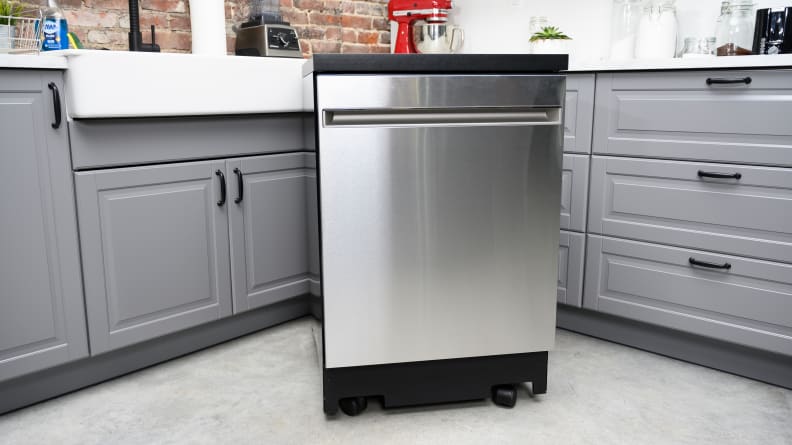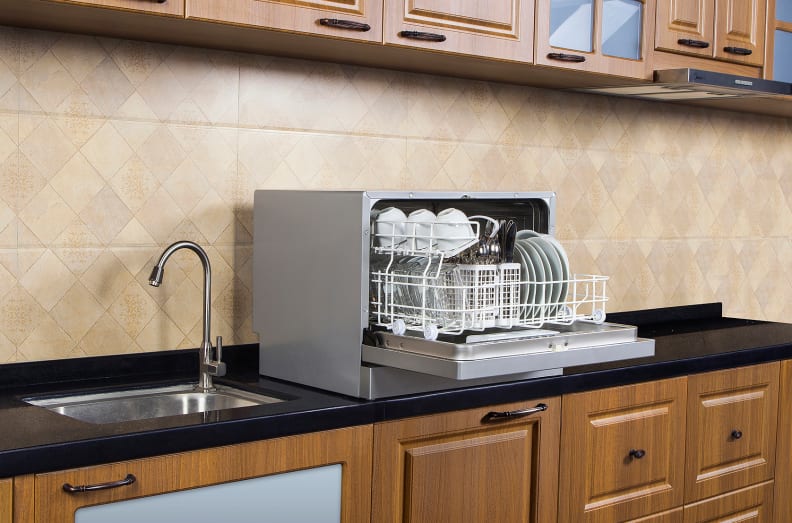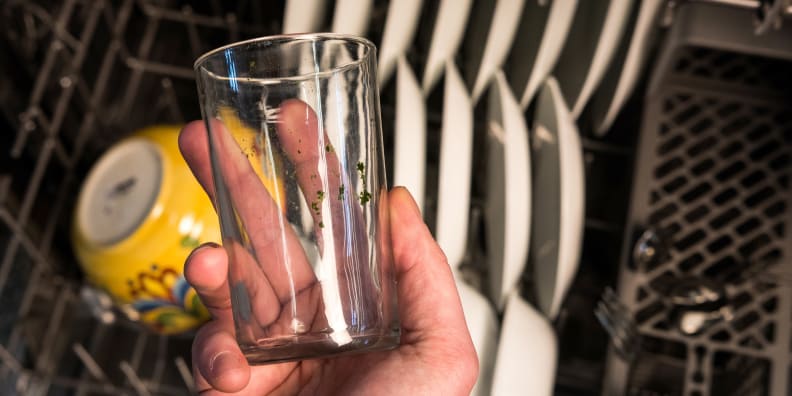5 things to keep in mind when buying a new dishwasher
Everything you need to know to find your perfect dishwasher
Products are chosen independently by our editors. Purchases made through our links may earn us a commission.
With so many different dishwashers on the market, all claiming to make the household chore even easier, it can be difficult knowing which one best suits you. We've spent years testing hundreds of dishwashers, so we know what to look for when buying a new one.
It boils down to a few key factors: choosing the type of dishwasher that best works for your space and lifestyle, the price you're willing to pay, what will physically fit in your kitchen, where to buy one to snag a great deal, and how to maintain it so you're not on the hunt for another new dishwasher anytime soon.
Let us walk you through the steps to put hand-washing dishes behind you for good.
1. Decide what type of dishwasher you want
The first thing you'll need to do when shopping for a new dishwasher is narrow down what type of dishwasher best suits your needs. Just because you don't have room for a full-size dishwasher doesn't mean you're stuck with hand-washing: Portable or countertop dishwashers might be a better fit for you. Here's an outline of each main category of dishwasher.
Standard dishwashers that require installation

Installation dishwashers will install right into your kitchen counter and hook directly into your kitchen's water source.
This is the most common type of dishwasher. Dishwashers that require installation are typically 24- or 18-inches wide, and connect directly to the water intake in your kitchen. Installation dishwashers are the standard for homes with full-size kitchens that have the space and water connections to accommodate them. As a result, they likely won't be a realistic option for smaller kitchens or apartments.
Portable dishwashers

Portable dishwashers hook up to your faucet while in use, but can be wheeled away otherwise.
Portable dishwashers are roughly the same size as installation dishwashers, but come with attached wheels so they can be repositioned around your kitchen when not in use, or even serve as extra counter space.
While their ability to move around gives them some flexibility, no one will be able to use the sink while it's running since they connect to your faucet for their water supply and output wastewater down the drain. You'll also need to make sure the drainage hose is secured when in use, because otherwise there's a chance it could fall out of the sink and drain sudsy water all over your kitchen floor. Not that we know from experience or anything.
Countertop dishwashers

Countertop dishwashers are small, making them perfect for cramped kitchens—but their reduced capacity means needing to run more frequent wash cycles.
Also referred to as “compact dishwashers,” countertop dishwashers are ideal for smaller living spaces and are more convenient and efficient than hand-washing. These dishwashers are about half the size as a typical dishwasher and, true to their name, can sit on your countertop.
While their small size is often a boon, it also has its downside: Countertop dishwashers have about half the capacity of a full-size model, which means you'll need to run twice as many wash cycles to clean the same amount of dishes. Also, like portable dishwashers, these connect to your kitchen faucet and need to drain into the sink—this means your sink will be out of commission about twice as often as with a portable dishwasher, which can be a problem if you have a large family or a lot of roommates. As a result, countertop dishwashers are most ideal for small apartments with just a few people.
2. Determine what features matter to you most
Once you know what type of dishwasher you want, you need to narrow down which features you care about the most. Are you looking for a dishwasher that perfectly compliments your kitchen's design? Do you cook a lot, resulting in tons of baked-on food stains that are notoriously difficult to clean? Maybe you don't have any specific needs and are just looking for the best value for your dollar. Regardless of which qualities are most important to you, there's a dishwasher out there that has them.
Price
For some, price is the number-one concern; for others, it’s not even a factor. Before you go any further, decide where you fall on that spectrum and figure out how much you want to spend. Make sure your price range isn’t so narrow that it limits your options with regard to dish capacity or cleaning efficiency. There are plenty of affordable dishwashers out there that can fall somewhere in the sweet spot.
But be aware that, regardless of your budget, you can expect to spend at least $600 for a good, full-size dishwasher and roughly half that if you're shopping for a countertop model. If you do find a dishwasher that's much cheaper, keep in mind those models usually lack sensors and internal water heaters—they'll typically use more water and energy and not get your dishes as clean.
Water and energy consumption will also factor into your dishwasher's cost over its lifetime, but based on our testing, there isn't a ton of difference between most modern dishwashers. Unless your local water and energy prices are exceptionally high, the difference from one unit to another will typically amount to just a few dollars per year.
Performance
If cost isn’t your biggest concern, performance probably is. Aside from sheer cleaning power, you also need to consider things like wash speed, drying efficiency, and how noisy the machine is while in use. A lot of dishwashers also come equipped with extra features like Delicates and Eco Wash cycles that may be important to you.
Some of these perks are less vital than others, and their importance depends largely on the types of dishes you’ll be putting in your machine. Don’t let frivolous extras tempt you into spending too much, but at the same time, don’t let a tight budget discourage you from legitimately useful features like sanitation cycles, bottle washing jets, and third racks.
Design
Finally, there’s design. Some buyers place serious value on the look of their dishwasher, particularly on how well it meshes with the rest of their kitchen. Fortunately, above a certain price point, most dishwashers can blend in with pretty much any modern kitchen design. Stainless steel is a near-universal option, though many manufacturers charge extra for it. Some finishes, like GE’s Slate and LG’s Black Diamond, would need to be purchased as a whole-kitchen suite to ensure a uniform look.
You should also consider the control layout. Traditional designs feature buttons on the front of the machine, but many newer models move the controls to the top of the door to provide a cleaner, more modern aesthetic. To let you know when the dishes are clean, some of these machines will even project an indicator light or countdown timer onto the floor beneath the unit.
If you want your dishwasher to really blend in with your cabinetry, you may want to consider a panel-ready machine. These specialized models can accept custom fronts, but may require more intensive consultation with kitchen designers and installers.
3. Measure the space, then measure again

Unless you want to buy a custom-front, counter-depth dishwasher like this Bosch, you're probably looking for a standard 24-inch machine.
Unless you’re in the market for a countertop or portable dishwasher, your options are limited to standard 24-inch or compact 18-inch models. Measure the width of your space before buying. And if you want one that’s going to sit perfectly flush with your cabinets—like in a home design magazine—you'll also need to grab a tape measure and determine your available depth. Double-check all measurements before purchasing.
4. Get shopping
There are two ways to shop for appliances these days: online, or in a brick-and-mortar store. Each option has its pros and cons, but if you’re serious about getting the right dishwasher, you’ll probably want to try both. While a physical store might have a more limited selection than an online retailer, there's no substitute for being able to play around with a dishwasher in person to see if it has the feel you want.
As you conduct your research, note the MSRP of each model and check to see if any sellers currently have it on sale. But keep in mind that the retail price isn’t the full sum—there’s also the cost of delivery and installation. Depending on where you live, you may also have to pay sales tax, a cost that may or may not be applicable to online purchases.
If you’re able to install a dishwasher yourself, you'll will save on installation costs, but keep in mind there will be some minor plumbing and electrical work, and you might need some extra fixtures and adaptors that don't come with your dishwasher. Do your research ahead of time, and don't be afraid to pay your retailer (or third-party handyman) to do the installation for you. Too many buyers overlook this crucial step and end up paying more than necessary.
Many retailers will also take care of "haul-away," taking your old dishwasher off your hands and disposing of it properly. If you opt out of those services—or the retailer doesn't offer them—contact your local municipality for information on how to dispose of old appliances.
5. Keep it feeling like new
Proper dishwasher care begins and ends with you. Yes, there’s a certain degree of variation between brands and models, but much of a machine’s cleaning performance depends on how well you care for it.
Clean the filter regularly

Redeposit is unsightly and unsanitary. Usually, it's the result of a poorly maintained dishwasher filter.
Most homeowners completely overlook the importance of cleaning out the dishwasher filter. This should ideally be done at least every other cycle, since food buildup in the filter can drastically reduce the machine’s cleaning power and lead to unsightly redeposit.
Keep mold at bay
There’s one more enemy of good dishwasher performance: mold. Though it's unusual for it to become a serious problem, the fact is that dishwashers are dark, warm, moist environments that easily collect and redistribute food particles. It's a pretty ideal place for mold.
If mold shows up in your machine, periodically clean the interior with a bleach solution, wiping down any surface with mold or caked-on food debris. Do the same for the gaskets that run along the door. Remove the racks and check the spray jets for any additional debris. Once you’ve given the machine a thorough hand-washing, return the racks to their holders and run the empty dishwasher on a normal cleaning cycle.
More resources to help you find the best dishwasher for you
Armed with these tips and resources, it should be relatively easy to narrow down which dishwasher is best for you. If you're at the step where all that's left is the research, feel free to use our current lists of the best dishwashers in each category. We lab-test and review dozens of dishwashers every year, so we've narrowed the field down to only the best of the best. These articles are a great place to start.


